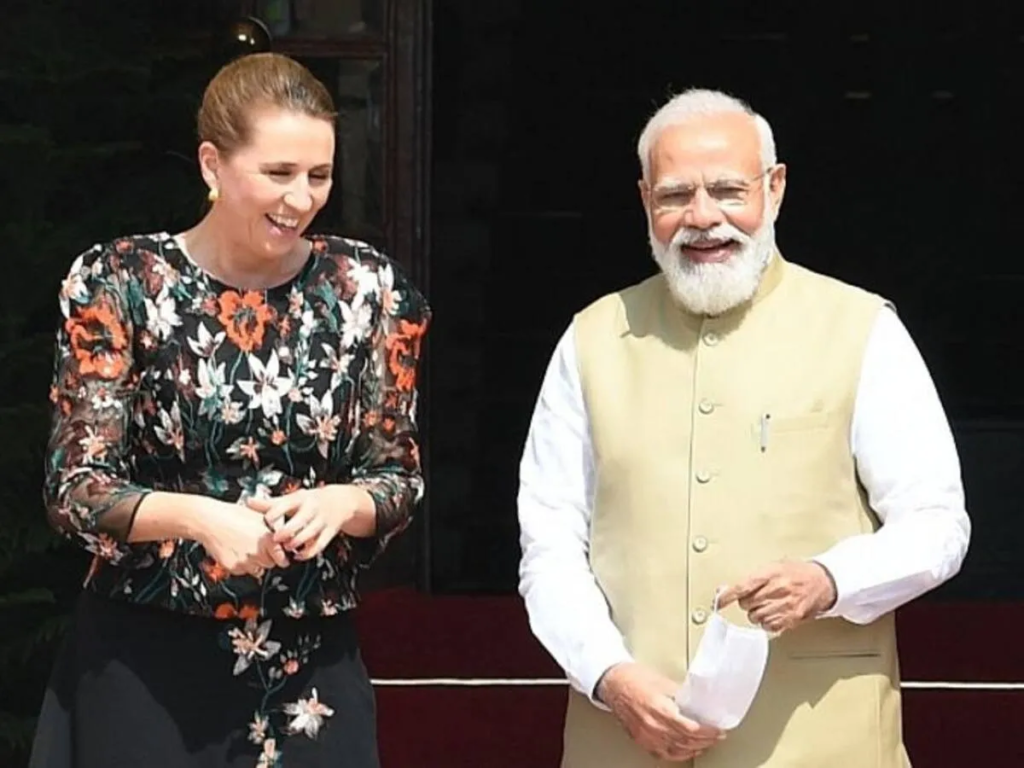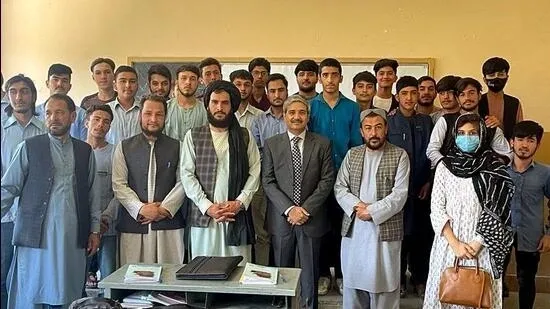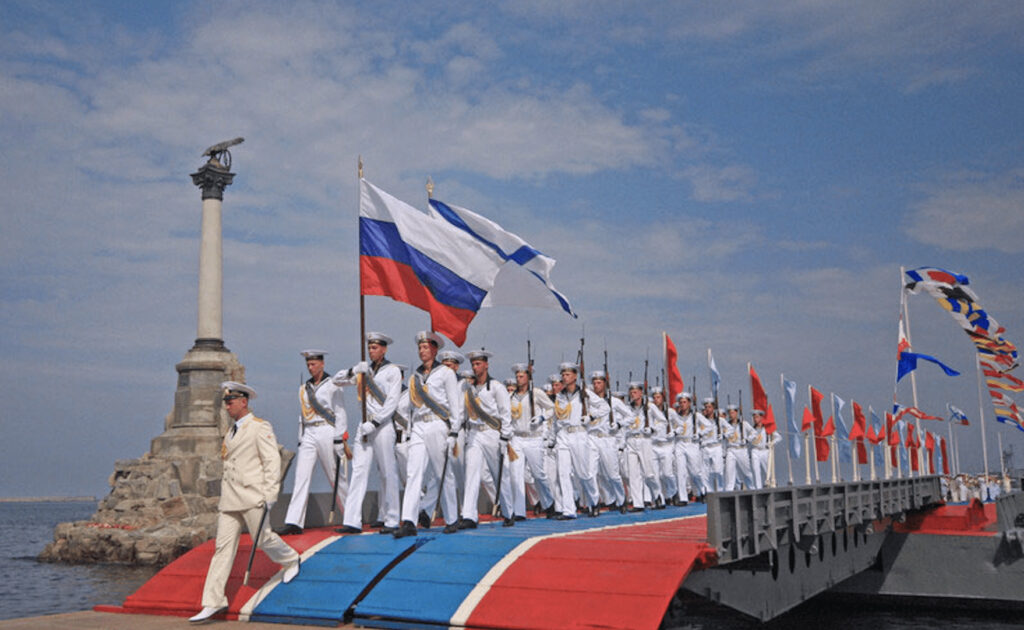
By Habib Al-Badawi
Executive Summary
The recent port visit by the Russian frigate Marshall Shaposhnikov to Eritrea’s Massawa harbor has brought into sharp focus Moscow’s reinvigorated ambitions in the critical Red Sea region. This naval deployment, coinciding with the 30th anniversary of Russia-Eritrea diplomatic ties, represents the Kremlin’s latest attempt to secure a strategic foothold in this vital global maritime chokepoint after facing repeated US vetoes on establishing bases in Djibouti and Sudan.
As Russia intensifies military cooperation with the isolated Eritrean regime of President Isaias Afwerki, questions arise about the implications for regional security dynamics and a potential escalation of great power rivalries in the Red Sea.
- Historic Ambitions Rekindled in the Red Sea
The Red Sea has held an enduring geopolitical allure for great powers throughout the centuries, serving as a vital maritime nexus linking Europe, Asia, and Africa. Russia’s contemporary machinations on this strategic waterway are a revival of long-standing interests dating back over two hundred years to the twilight of the 18th century. During that era, the Russian Empire actively cultivated influence in the Red Sea basin by lending support to local forces opposed to Ottoman dominance.
Partnering with European rivals of the Ottomans, such as Austria, the overarching Russian imperative was to uphold and assert the principle of international “freedom of navigation” in this critical maritime chokepoint. Moscow recognized the indispensable economic and military significance of ensuring unimpeded maritime access through the Red Sea—a lifeline connecting the European continent to overseas dominions in Asia.
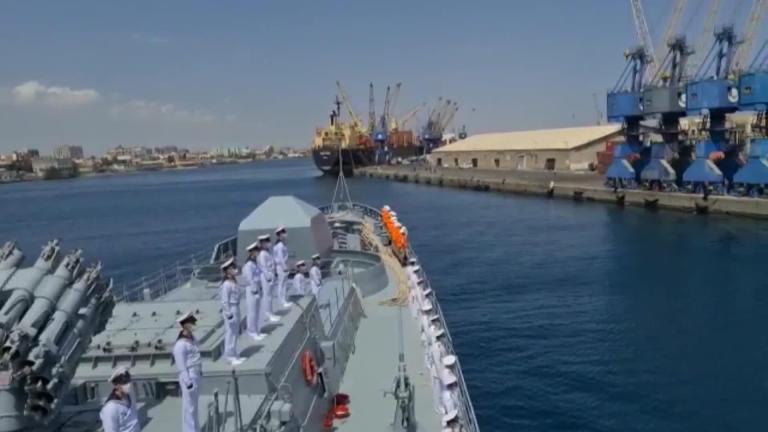
In the 21st century, the Kremlin appears to be resolutely bent on rekindling Russia’s faded yet substantial historical ambitions in this arena. However, rather than the proxy warfare of yesteryear, Moscow is now directly cultivating an opportunistic partnership with Eritrea, one of the world’s most reclusive and isolated regimes.
The Russian frigate Shaposhnikov’s recent visit to Eritrea’s port of Massawa constitutes a brazenly overt signal of the Kremlin’s determination to parlay burgeoning military ties with Asmara into a tangible naval presence and potentially permanent based facilities along the Red Sea’s vitally strategic shipping lanes.
By cozying up to the Afwerki regime, Moscow is maneuvering to resurrect its centuries-old quest for meaningful maritime access and force projection capabilities astride this choke-point waterway. Buttressed by Eritrea’s overtly anti-Western leanings, this gambit could decisively upend the traditional security architecture in the Red Sea basin, a prospect necessitating heightened vigilance from rivals wary of Russian encroachments in their strategic backyard.
Accelerating Russia-Eritrea Military Embrace
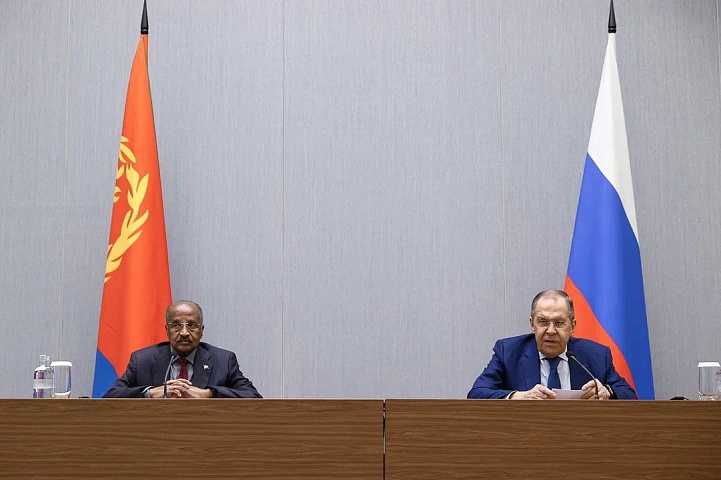
While economic ties between Moscow and Asmara have remained relatively anemic despite recent growth, bilateral military and strategic cooperation has witnessed a startling acceleration over the past two years. This rapid development signals an ominous shift with profound implications for the delicate security dynamics in the Red Sea basin.
The diplomatic tectonic plates first began to meaningfully shift in July 2023, when Eritrean President Isaias Afwerki undertook a landmark visit to Moscow. In meetings with his Russian counterpart Vladimir Putin, Afwerki delivered a fiery denunciation of “the crazy ideology and actions of the West” in a symbolic display of Asmara’s disdain for the prevailing US-led global order. This unequivocal rhetorical embrace of Moscow’s worldview marked Eritrea’s decisive pivot towards cozying up to Russia and its axis of “Global South” authoritarian allies.
Within months, this diplomatic offensive culminated in concrete strategic dividends for Russia’s resurgent ambitions in the Red Sea region. In April 2024, a high-level Russian naval delegation led by Deputy Commander Vladimir Kasatonov descended on Eritrea’s port of Massawa for extensive meetings with top military brass.
According to reports, the two sides fleshed out a comprehensive roadmap for rapidly scaling up bilateral cooperation across a sweeping array of sectors: infrastructure, energy, mining, agriculture, maritime resources, defense, and security. These exhaustive discussions were guided by a framework agreement previously hashed out during Afwerki’s trip to St. Petersburg in July 2023.
Such multifaceted plans leave no doubt that Moscow and Asmara are engaged in concerted efforts to elevate their economic, military, and cultural partnership to unprecedented, deeply institutionalized levels. The high-stakes diplomacy witnessed during the Massawa summit went far beyond the mere symbolism of celebrating 30 years of diplomatic ties between the two nations.
Rather, the Russian delegation’s choice to hold meetings aboard the frigate Shaposhnikov, anchored opposite Saudi Arabia’s Jizan port near the Yemeni border, intentionally underscored the strategic location and military significance of securing based rights and permanent maritime access along Eritrea’s Red Sea coastline.
For Moscow, the ultimate prize is to translate growing political solidarity with the anti-Western Afwerki regime into a tangible beachhead for force projection capabilities across this vital regional chokepoint. An emboldened Russia can forward-deploy naval assets from friendly Eritrean facilities. This could profoundly disrupt the conventional military equilibrium in the Red Sea, a prospect triggering serious consternation among traditional US allies. As Russia’s strategic partnership with Eritrea intensifies, a new equation is taking shape with potentially destabilizing consequences for the future regional security architecture.
- Enabling Forces Catalyzing Russia-Eritrea Ties
Several potent geopolitical forces have coalesced to catalyze the burgeoning strategic partnership between Russia and Eritrea, despite their surface-level differences as nations. This convergence of interests has only intensified against the backdrop of Moscow’s internationally condemned invasion of Ukraine and its deepening isolation on the global stage.
- Asmara’s Self-Serving Alliance Proclivity: Since achieving independence in 1993, the reclusive Eritrean regime has adeptly cultivated a self-serving history of forging opaque, transactional security partnerships with an array of diverse international powers. From Israel and the United Arab Emirates to Iran, China, and Saudi Arabia, Asmara has proven itself a peerless strategic hedge, deftly playing disparate actors against one another to bolster the Afwerki regime’s regional standing and clout.
- This deeply engrained penchant for relentless alliance maneuvering renders the isolated nation’s pivoting into Russia’s embrace an appealing gambit amid the Kremlin’s confrontation with the West over Ukraine—a crisis in which Eritrea overtly backed Moscow at the United Nations.
- Ideological Affinities Versus the West: Underpinning the Russia-Eritrea partnership is a shared antagonistic posture and bristling ideological resentment towards perceived Western hegemony and criticism of their authoritarian governance models. President Afwerki’s vehement anti-Western rhetoric, exemplified by his fiery denunciation of “the crazy ideology and actions of the West” during a 2023 Moscow summit, aligns seamlessly with the Kremlin’s self-portrayal as a standard bearer for “Global South” resistance against a US-led, rules-based international order.
- This ideological convergence over sovereignty, self-determination, and defiance of liberal democratic norms creates a powerful glue binding Moscow and Asmara despite their geographical distances and national distinctions.
- Survival Through Patronage: As a deeply authoritarian pariah state labeled one of the world’s most repressive regimes, the impoverished and economically stagnant Eritrean government under President Isaias Afwerki faces crippling economic sanctions from the UN and international ostracization.
- In this dire context of potential domestic fragility, securing the economic and diplomatic patronage of resurgent anti-Western powers like Russia and China willing to provide an anti-democratic lifeline has become an existential imperative for perpetuating Afwerki’s iron-fisted rule. Making strategic concessions, such as granting military base rights, is a small price for Asmara to pay if it unlocks vital economic and security guarantees from its new great power benefactors.
These multifaceted drivers—an innate Eritrean predilection for transactional alliances, desperate dependence on foreign patronage for regime survival, and overriding philosophical alienation from Western liberalism—have catalyzed conditions ripe for Russia’s strategic encroachment into the crucial Red Sea arena via the Eritrean gateway. As Ukraine crisis drags on, Moscow’s embrace of Asmara will likely only deepen further, elevating the risk of destabilizing ripples across the region’s precarious security landscape.
- Constraints on Unrestrained Russia-Eritrea Alignment
While the catalyzing forces propelling closer Russia-Eritrea ties are formidable, the same factors paradoxically harbor inherent constraints that could inhibit the depth and longevity of their partnership over the long run.
- Asmara’s Jealously Guarded Policy Autonomy: Throughout its post-independence history, Eritrea has tenaciously pursued an independent foreign policy path in the region, undeterred by external pressure campaigns. From staking out controversial positions in crises like the Ethiopia-Egypt dispute over Nile River resources and the intractable Sudanese turmoil, the Afwerki government has proven itself adept at strategic hedges to preserve maximal policy autonomy and space for nationalist maneuverability.
- This well-honed penchant for determinedly charting its course, unbeholden to the preferences of foreign powers, could ultimately collide with Russia’s desire to leverage security partnerships for more unilateral gain—a recipe for friction that moderates the partnership’s ceiling.
- Asmara’s Self-Reliance Dogma Prioritized: While hungrily welcoming Russian economic investment and security support to offset Western sanctions and pressures, the authoritarian Eritrean regime remains pathologically averse to transactional dependency that could undermine its outwardly projected nationalist credibility at home.
- Emboldened by its narrative of a decades-long struggle for hard-won independence and self-reliance, Asmara will inevitably balk at cultivating relations with Moscow to the extent of compromising its cherished sovereignty and losing its equalizer of maneuverability between great powers. These sensitivities necessitate a pragmatic cap on the depths Russia can extract from this partnership without incurring pushback.
- The Specter of Asmara’s Alliance Transience: Eritrea’s entrenched modus operandi of constantly recalibrating its “tactical” alliances based on the overriding prerogative of regime survival casts a pall of doubt over Asmara’s willingness to irrevocably lash itself into Moscow’s orbit or any single great power bloc indefinitely.
- True to form, the isolated Horn of Africa nation has masterfully played off an array of international partners against each other—from Israel to Iran to China—to maximize its strategic flexibility and leverage. This ingrained tradition of fickle, opportunistic alliance-swapping to best preserve the Afwerki regime raises legitimate questions about the long-term viability of Eritrea’s deepening partnership with an increasingly alienated Russia.
Ultimately, while the logic of Russia’s courtship of Eritrea as a Red Sea foothold is inescapable from a realpolitik perspective, the mercurial, self-preserving nature of the Afwerki regime itself harbors inherent limitations on how enduring and absolute this partnership can truly become. Asmara’s cynical tradition of alliance transience, pride in jealously guarded policy independence, and resolute self-reliance dogma will circumscribe the benefits Moscow can derive. This push-and-pull dynamic renders the long-term trajectory of Russia-Eritrea ties hazier than current rhetoric suggests—a crucial nuance for analysts contemplating the partnership’s full geostrategic implications.
- The Looming Red Sea Security Conundrum
Regardless of the constraints impeding an absolute Russia-Eritrea condominium, their steadily warming bilateral embrace carries profound implications for the delicate geostrategic equilibrium in the Red Sea basin, a vital maritime arena straddling major global trade arteries.
During the high-stakes Massawa summit in April 2024, Moscow made overt attempts to assuage regional anxieties by explicitly reaffirming its rhetorical commitment to peace and stability efforts in the Red Sea and the wider Horn of Africa. Such public assurances were undoubtedly welcomed by Asmara as well as neighboring states like Sudan, Ethiopia, and Djibouti harboring grave trepidations about potential Russian military encroachments in their strategic backyards.
However, the unmistakable signal delivered by the Russian delegation’s accompanying display of formidable naval might sends an unambiguous message: the Kremlin is determined to robustly challenge perceived US-led maritime hegemony across vital global shipping lanes.
Most notably, the Russian frigate Shaposhnikov leading the maritime component was flanked by the potent Varyag-guided missile cruiser, an overt exhibition of Russia’s offensive naval combat capabilities hinting at potential future “gray zone” operations or escalated force projection in the Red Sea theater.
Moreover, credible intelligence assessments indicate Moscow and Asmara are in the final stages of concluding a landmark agreement proposed five years ago—for Russia to establish a dedicated naval logistics and refueling hub on Eritrean soil. If actualized, this gambit would mark a watershed expansion of the Kremlin’s strategic military-logistical footprint across the Horn of Africa, potentially reviving a dynamic akin to the Soviet Union’s quest for regional preeminence during the Cold War era.
Added to the regional powder keg, while Eritrean state media-maintained silence, Russia’s ambassador in Asmara explicitly confirmed Shaposhnikov’s Port visit overtly aimed “to participate in exercises with Eritrea for the first time.” Such prospective joint naval drills would brazenly inaugurate a new era of overt Eritrean enmeshment in Russia’s burgeoning anti-US maritime coalition alongside revisionist powers like China and Iran operating in the same waters.
If the worst-case scenario of an emboldened Eritrean regime, boasting the third-longest coastline among littoral states and a constellation of strategic islands abutting Yemen’s territorial waters, irrevocably pivots into the Russo-Sino-Iranian naval orbit, the profound risks to maritime security and freedom of navigation at this globally vital chokepoint could be catastrophic. An entrenched counter-hegemonic presence could project credible anti-access/area denial (A2/AD) capabilities, imperiling the commercial and military nautical lifeblood of the United States and its regional partners.
In essence, while currently limited in tangible scope, Russia’s deepening strategic dalliance with the isolated, belligerent Eritrean regime carries sweeping risks of igniting a tectonic upheaval in the contested Red Sea arena, potentially remilitarizing, and destabilizing this crucial maritime crossroads at the fulcrum of major global trading routes. Even the specter of growing Russian naval forces and A2/AD facilities enabled by an Eritrean beachhead necessitates profound scrutiny from Washington and its allies.
The intolerable risks of allowing the vehemently anti-Western Afwerki regime to forge entirely unchecked security ties with America’s great power rivals portend an intensifying cycle of great power competition and maritime brinkmanship in the Red Sea theater, with profound ramifications for the sustainability of the global rules-based maritime order premised on freedom of the seas.
- Strategic Implications and Policy Considerations
Russia’s accelerating outreach to secure strategic footholds in the Red Sea arena via its burgeoning partnership with Eritrea represents a development fraught with immense geostrategic consequences. For the Kremlin, the alluring prospect of translating its deepening political-military ties with the anti-Western Afwerki regime into tangible naval based and maritime access rights along Eritrea’s Red Sea coastline could resurrect Russia’s faded yet substantial historical ambitions as a great power player in this vitally important waterway.
From Moscow’s realpolitik calculus, an Eritrean beachhead enabling permanent naval presence astride global shipping chokepoints offers manifold potential dividends, reviving Russia’s long-coveted capability to project maritime power and safeguard crucial sea lines of communication, undermining perceived U.S.-led hegemony across strategic trade routes, reinvigorating Russia’s geopolitical heft in Africa’s strategic Horn, and laying the foundations for an expanding counter-hegemonic naval coalition with revisionist partners like China and Iran.
However, the risks to regional stability and freedom of navigation in the Red Sea basin stemming from an unconstrained Russia-Eritrea axis cannot be discounted. The worst-case scenario of an emboldened, remilitarized Eritrea hosting Russian naval forces armed with credible anti-access/area denial (A2/AD) capabilities could upend the fragile regional security architecture and rules-based maritime order. A cascading cycle of escalating great power rivalry and brinkmanship, perhaps even outright conflict, would imperil global interests centered on this global economic artery.
Consequently, the deepening Russia-Eritrea partnership demands judicious scrutiny and calibrated countervailing policies from the United States and its allies invested in upholding navigational rights and regional stability in the Red Sea domain:
- Bolstering military and intelligence cooperation and forward presence among U.S. regional partners like Egypt, Saudi Arabia, the UAE, and partners across the Horn to enhance maritime domain awareness and deterrence posture.
- Exploring negotiated confidence-building measures and mutual restraint protocols with Russia to defuse escalatory Red Sea maritime tensions and prevent inadvertent triggers for conflict.
- Rallying multinational diplomatic censure over any provocative Russian attempts to establish based facilities or engage in destabilizing naval maneuvers that imperil freedom of navigation.
- Sustained diplomatic engagement with Asmara to dissuade overreliance on Moscow and highlight the economic and reputational perils of facilitating Russian encroachments. Leveraging incentives and pressures to reinforce Eritrea’s historical penchant for strategic autonomy.
Ultimately, the U.S. and its regional allies possess substantial economic, military, and diplomatic levers to counter Russia’s gambits aimed at redrawing the Red Sea’s security architecture to its advantage. However, adroit policies blending deterrence and diplomacy will be paramount to upholding rules-based maritime order while mitigating the risks of unintended escalation into kinetic confrontation—imperatives that argue for calibrated approaches rather than overreaction or excessive compliance.
As great power competition accelerates across multiple theaters, the Red Sea arena and Russia’s courtship of Eritrea emerge as one pivotal arena where judicious burden-sharing between the U.S. and its regional partners, coupled with deft great power crisis management tools, will be indispensable to preserving navigational rights and preventing open conflict over this global economic lifeline. Intensive policy formulation centered on upholding this strategic imperative must be prioritized by stakeholders in the emerging era of renewed maritime rivalry.
Bibliography
Government/Publication from Official Source:
- President of Russia. (2023, July 28). Meeting with the president of Eritrea, Isaias Afwerki. http://en.kremlin.ru/events/president/news/71830.
- The Eritrea Ministry of Information. (2024, April 1). The Deputy Commander of the Russian Naval Force arrives in Massachusetts. Shabait. https://shabait.com/2024/04/01/deputy-commander-of-russian-naval-force-arrives-in-massawa/.
Academic/Scholarly Articles:
- Müller, Tanja. (2016). Representing Eritrea: geopolitics and narratives of oppression. Review of African Political Economy. 43. 658-667. https://doi.org/10.1080/03056244.2015.1111201.
- Rothwell, D. R., & Bateman, S. (Eds.). (2021). Navigational Rights and Freedoms and the New Law of the Sea. Leiden, The Netherlands: Brill | Nijhoff. https://doi.org/10.1163/9789004482661.
Reports/Analysis:
- Keir Giles. (2016, March). Russia’s ‘New’ Tools for Confronting the West Continuity and Innovation in Moscow’s Exercise of Power. Chatham House. https://www.chathamhouse.org/sites/default/files/publications/2016-03-russia-new-tools-giles.pdf.
- Habtom Ghebrezghiabher, Tesfazion Gerhelase. (2022, April 13). Eritrea: Supporting Russia to stay in power. The Washington Institute. https://www.washingtoninstitute.org/policy-analysis/eritrea-supporting-russia-stay-power.
- Andrew McGregor. (2023, November 6). Russia in the Red Sea: Port options in Eritrea (Part two). Jamestown. https://jamestown.org/program/russia-in-the-red-sea-port-options-in-eritrea-part-two/.
News Articles:
- Duncan Miriri. (2023, January 27). Lavrov shores up Eritrean support for Russia over Ukraine conflict. reuters.com. https://www.reuters.com/world/lavrov-bolsters-eritrean-support-russia-conflict-with-ukraine-2023-01-27/.
- Apofeed. (2023, July 30). Eritrea: President Isaias Afwerki held talks with President Putin. African Business. https://african.business/2023/07/apo-newsfeed/eritrea-president-isaias-afwerki-held-talks-with-president-putin.
- Choi, S. H. (2024, March 15). China, Russia, and Iran stage anti-piracy drills as Red Sea attacks escalate. South China Morning Post. https://www.scmp.com/news/china/military/article/3255531/china-russia-and-iran-stage-navy-drills-aimed-fighting-pirates-red-sea-attacks-escalate.
- ADF. (2023, September 5). In Eritrea, China and Russia seek Red Sea dominance. Africa Defense Forum. https://adf-magazine.com/2023/09/in-eritrea-china-and-russia-seek-red-sea-dominance/.
- Baloi, A. (2024, January 3). Naval expansionism: Russian naval base in Eritrea. Grey Dynamics. https://greydynamics.com/naval-expansionism-russia-to-establish-navy-bases-in-eritrea/.


